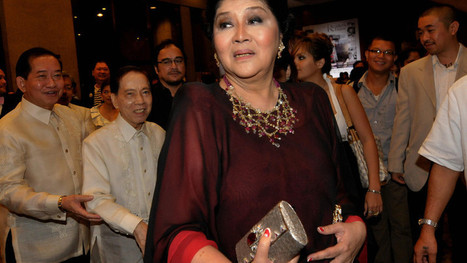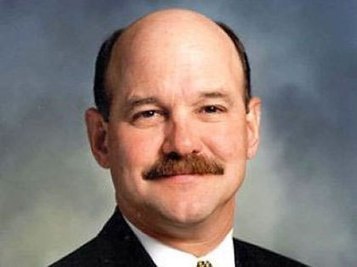 Your
new post is loading...
*** Key findings from PwC's 17th Annual Global Economic Crime Survey
*** Cyber crime: the Achilles heel of the business world
*** Ukraine’s
$19-billion question of debt and corruption
*** FBI announces campaign to crack down on public corruption
*** Ukraine’s $19-billion question of debt and
corruption
Former Utah Attorneys General John Swallow and Mark Shurtleff were arrested
and charged Tuesday on allegations ranging from accepting bribes to destroying
evidence.
Both were arrested at their Sandy homes by members of the FBI and the Utah
Department of Public Safety, and they arrived at the Salt Lake County Jail
shortly after 8 a.m.
The state's former top law enforcement officials were charged in 3rd District
Court with pattern of unlawful activity, a second-degree felony; and three
counts of receiving or soliciting bribes by a public official, a third-degree
felony.
In addition, Shurtleff was charged with illegally accepting gifts or loans, a
second-degree felony; two counts of receiving bribes by a public official, a
third-degree felony; witness tampering, a third-degree felony; tampering with
evidence, a class A misdemeanor; and obstruction of justice, a class A
misdemeanor.
.
The Justice Department, along with federal and state partners, today
announced a $7 billion settlement with Citigroup Inc. to resolve federal and
state civil claims related to Citigroup’s conduct in the packaging,
securitization, marketing, sale and issuance of residential mortgage-backed
securities (RMBS) prior to Jan. 1, 2009. The resolution includes a $4 billion
civil penalty – the largest penalty to date under the Financial Institutions
Reform, Recovery and Enforcement Act (FIRREA). As part of the settlement,
Citigroup acknowledged it made serious misrepresentations to the public –
including the investing public – about the mortgage loans it securitized in
RMBS. The resolution also requires Citigroup to provide relief to underwater
homeowners, distressed borrowers and affected communities through a variety of
means including financing affordable rental housing developments for low-income
families in high-cost areas. The settlement does not absolve Citigroup or its
employees from facing any possible criminal charges.
This settlement is part of the ongoing efforts of President Obama’s Financial
Fraud Enforcement Task Force’s RMBS Working Group, which has recovered $20
billion to date for American consumers and investors.
“This historic penalty is appropriate given the strength of the evidence of
the wrongdoing committed by Citi,” said Attorney General Eric Holder. “The
bank's activities contributed mightily to the financial crisis that devastated
our economy in 2008. Taken together, we believe the size and scope of this
resolution goes beyond what could be considered the mere cost of doing
business. Citi is not the first financial institution to be held accountable by
this Justice Department, and it will certainly not be the last.”
Last week former New Orleans Mayor Ray Nagin became the latest American
politician to be sent to jail for abuse of power, following in the footsteps of
former Detroit Mayor Kwame Kilpatrick and onetime Illinois Congressman Jesse
Jackson Jr. Despite such high-profile convictions, most Americans see political
corruption as a problem that plagues the developing world far more than the U.S.
The truth is more complex: It’s certainly the case that paying bribes is a lot
less common in the U.S. than in Nigeria or Bolivia, for example. But when
citizens are asked if corruption is prevalent in their country, they’re thinking
about a lot more than bribes. They’re more concerned about whether government
and the political system is fair or stacked against them. And on those grounds,
there are good reasons to think the difference between the U.S. and developing
countries isn’t very big at all.
It doesn’t take a detailed look at Transparency International’s Corruption
Perceptions Index to work out which types of countries are viewed to be
particularly corrupt by the political risk analysts, aid agency economists, and
think-tank staff whose opinions the index reflects...
Nagin wasn’t convicted of taking a bribe. His big crimes were related to
steering business to his family’s kitchen countertop company. That underscores
a vital truth: There are lots of different ways to be corrupt. And when you
survey people around the world about the problem of corruption in their country,
most have a definition of “corruption” that’s broader than bribery. Ask the same
people, “Have you paid a bribe,” and then ask, “Is corruption a problem in this
country?” and the relationship between the two answers is weak. Again, ask the
same companies, “How much do you pay in bribes?” and “Is corruption a major
constraint to doing business,” and many who say bribery in their industry is
common also don’t see corruption as a problem—while many who don’t pay bribes
are convinced corruption is holding them back.
People in
MANILA (Reuters) - Philippine President Benigno Aquino's performance ratings
have plunged to their lowest ever, two independent pollsters said on Monday, as
a perception grew that he is not serious enough...
"This is the largest decline in both approval and trust and it's also his
lowest performance thus far," Ana Maria Tabunda, Pulse Asia research director,
said in a television interview.
People were disillusioned by widespread corruption in government, she said,
adding that her poll was taken at the same time that the government arrested
three senators on plunder charges for misuse of congressional funds and rising
cost of rice and other food.
Tabunda said the survey was largely complete by the time the Supreme Court
rejected an Aquino creation of a discretionary fund, called the Disbursement
Acceleration Program (DAB), which has become the administration's worst crisis
in four years.
Georgia doesn't rank among the most corrupt states in the nation, according
to a recent study. But it doesn't rank among the least corrupt either...
“I haven’t been able to access the full study, but I’m not sure this is
the best methodology,” said Matthew Hipps, assistant professor of political
science at Dalton State College.
“I’m not sure that the number of
convictions really tells us how much corruption there is in an area,” he added.
“It’s a measure, but it’s not a very nuanced
measure.”
A former chief executive of the country's biggest public pension fund
admitted that he took more than $250,000 in bribes and other valuable gifts from
a friend and co-defendant in an influence-peddling scandal that rocked the
pension investment world five years ago.
Federico R. Buenrostro Jr. pleaded guilty Friday to one federal charge of
conspiracy to commit corruption and fraud in funneling deals through his friend,
Alfred J.R. Villalobos, for outside firms to manage funds for the California
Public Employees' Retirement System.
We condemn the misconduct and ethical
breaches admitted today by Mr. Buenrostro.- CalPERS' statement
"It's a good day for justice, and was time for Mr. Buenrostro to admit his
wrongdoing," said Philip Khinda, a Washington lawyer who led an 18-month
internal investigation into a scandal that led to a slew of changes in CalPERS
operations and state law.
CalPERS, which manages about $300 billion in investments, said that it has
taken "aggressive steps" to put into place new policies and reforms to ensure
that its 1.6 million members — state and local government workers, retirees and
their families — are not victims of future criminal fraud by insiders.
"We condemn the misconduct and ethical breaches admitted today by Mr.
Buenrostro," the fund said in an email. "CalPERS looks forward to justice being
served in this case and for the individuals involved to be held accountable for
their actions."
Buenrostro, CalPERS' top official from 2002 until he was fired in 2008, said
in his plea agreement that Villalobos personally delivered $200,000 in cash
bribes in paper bags and shoe boxes, which were handed over at a Hyatt Hotel
across from the state Capitol.
As soccer fans flock to their televisions for the World Cup final this
weekend, the FBI and international investigators are looking ahead to
allegations of corruption and abuse halfway around the world in Qatar, where the
2022 games are scheduled to take place in one of the hottest places on earth --
where daytime temperatures regularly reach 124 degrees.
During the World Cup this year in Brazil officials declared
the first-of-its-kind water breakduring a match when the temperature hit the
mid-80s, fearing for the health of the players.
Before Qatar won their bid for the 2022 World Cup, soccer federation
officials were warned in advanced about the potentially dangerous heat in Qatar
that makes its capital of Doha look like a ghost town during the day – some 40
degrees hotter than during the pause in
Brazil.
...
A construction union whistleblower has blasted an ‘‘independent’’
investigation into the allegations of corruption he raised.
The Construction, Forestry, Mining and Energy Union on Friday released its
review into a string of allegations about misconduct by senior officials and
links to crime figure George Alex. The claims were raised by whistleblowers who
complained to CFMEU national secretary Michael O’Connor late in 2013.
The allegations will be heard when the Heydon royal commission into union
corruption sits in Sydney on Tuesday.
The complaints spurred the union to ask its law firm, Slater & Gordon, to
organise an investigation. It chose Sydney barrister Tony Slevin, whose report,
released on Friday, exonerates the union’s leadership but suggests changes to
the union’s rules dealing with whistleblowers and
complaints.
Thirty years on, public funding of Australian election campaigns has recorded
a striking lack of success at stopping corruption. As should have been expected
all along.
Among your weekend reading, don’t miss Mike Steketee’s piece in the Drumthis
morning on public funding of elections. He gets it, much better than most people
who write about this popular but misunderstood topic:
In the words of the report of a parliamentary inquiry, getting taxpayers to
pick up the tab “removes the necessity or temptation to seek funds that may come
with conditions imposed or implied” and “it may relieve parties from the
constant round of fundraising so that they can concentrate on policy problems
and solutions”.
As it turned out, less true words have seldom been spoken. Thanks
particularly to the Independent Commission Against Corruption in NSW, where the
Wran government was the first to introduce public funding in 1981, we now know
just how successfully politics has been cleaned up.
It’s remarkable that anyone could ever have believed this rationale, much
less continue to believe it with the weight of 30 years of evidence against it.
Expecting public funding to reduce corruption is a bit like setting up a welfare
system for gangsters in the hope that they will feel less need to rob
banks.
It happens with disturbing regularity.
A high-profile Louisiana politician gets caught with his or her hands in the
cookie jar, and there is the inevitable public outrage and embarrassment.
Unfortunately, incidents such as this reinforce an ugly and somewhat unfair
political stereotype of Louisiana.
Thanks to our shameful political history, there is a widespread perception
that we have more political corruption here than in many other places.
Anything that battles that image is welcome.
So, when former New Orleans Mayor Ray Nagin was convicted of fraud, bribery
and other corruption-related charges, it provided yet another chance for federal
prosecutors to serve notice that corruption will be discovered and punished.
Earlier this week, when federal Judge Ginger Berrigan sentenced Nagin to 10
years in prison, some observers worried aloud that the sentence was too
lenient.
The larger point, though, is that Nagin was caught, prosecuted, convicted and
sentenced.
Valdez accuses the health plans of “rampant fraud,” alleging they overcharged
Medicare $300 million to $350 million a year from 2007 through 2010. He claims
that Aveta Chief Executive Officer Richard Shinto fired him “in retaliation for
his outspoken opposition to these illegal practices.” Valdez filed the lawsuit
in Santa Ana, California, in April 2011, but it remained under court seal until
February of this year. The case is pending.
In a May 23 statement to the Center for Public Integrity, the health plans
called Valdez a “former disgruntled employee” and added that the company
“categorically denies the allegations in the former employee’s lawsuit and is
highly confident that it will prevail in the case.”
Valdez is a veteran health care executive and consultant who headed the
California regional office of the U.S. Department of Health and Human Services
from 2001 through 2003 under President George W. Bush. He also was a health
policy adviser to Republican Mitt Romney during the 2012 presidential race.
Valdez said in court papers that he served as president of MSO of Puerto
Rico, also owned by a subsidiary of Aveta, for eight months until his dismissal
in December 2010. MSO worked with local doctors to coordinate coverage for some
230,000 elderly and disabled people then enrolled in those two Aveta-related
Medicare Advantage health plans. In a press release touting his hire, Aveta said
Valdez would enhance medical care while “effectively managing healthcare
costs.”
|
A kickback scandal at America’s largest public pension included $200,000 of
cash stuffed into shoeboxes and paper bags.
When former CalPERS CEO Fred Buenrostro was charged more than a year ago by
both federal and state officials with fraud and obstruction of justice charges,
something didn’t seem right. The allegations focused on how Buenrostro had
forged documents to help placement agent pal Alfred Villalobos get paid by some
of his private equity clients, but there was no mention of Buenrostro personally
benefiting (beyond a $300k per year job with Villalobos upon retirement from
CalPERS). Not was there any evidence that Buenrostro improperly influenced
investment decisions at CalPERS.
But it seems he did both things, according to his guilty plea last Friday in
a San Francisco courthouse.
Anticorruption advocates—including those in the private sector who have taken
the fight against corruption seriously—insist that bribery is bad for business.
That’s likely true in the aggregate, and perhaps it’s true for some individual
firms. But it’s probably not true for all firms—otherwise, why would so many of
them pay bribes? But it’s hard to know how much firms benefit from bribery.
Likewise, while would be useful to know more about the factors that affect the
size and probability of bribery, figuring this out is a challenge because of the
secrecy of corrupt transactions.
In a recent working paper, Yan Leung Cheung, P. Raghavendra Rau, andAris
Stouraitis try to get at these questions by looking at enforcement data for
anti-bribery laws–both laws that apply domestically and those (like the U.S.
FCPA and the UK Bribery Act) that prohibit foreign bribery. In particular, the
study examines a subset of reported cases where (1) a bribe was (allegedly) paid
for a particular, identifiable public contract, announced on a specific date,
(2) there is stock and financial data for the firm, available on a day-to-day
basis, and (3) the enforcement data contains information on the size of the
bribe paid to secure the contract. Armed with that information, the authors
reason that we can use the abnormal increase in firm market capitalization that
coincides with the announcement of the contract as a measure of the gross
benefit of the bribe to the firm (the authors assume that bribe-paying firms
would not have gotten the contract without paying the bribe). We can then
subtract the size of the bribe from that gross benefit to get the net benefit of
bribery for the firm. On top of that, the authors reason that we can learn
something about how the total gains from the bribe transaction are allocated
between the firm and the corrupt public official by dividing the size of the
bribe payment by the sum of the bribe payment plus the gross benefit of the
bribe. The higher this ratio, the more the benefits of bribery go to the public
official; the lower this ratio, the more the benefits of bribery accrue to the
bribe-paying firm.
...
A Kenya Revenue Authority (KRA) audit has forced a number multinationals to
rewrite their financial statements, turning losses into profits in a review that
has yielded Sh25 billion in tax revenues...
Several multinationals had used the transfer pricing mechanism to declare
losses, which effectively disqualified them from paying income tax.But a KRA
audit of 40 conglomerates discovered widespread abuse of transfer pricing –
which refers to prices charged when one unit of a multinational group buys or
sells product from another part of the same group but in a different country.The
culprits are expected to agree with KRA on a payment schedule that will enable
them to clear the tax.
Citigroup announced Monday that it will pay roughly $7 billion to settle a
federal investigation into risky subprime mortgages, the type that helped bring
on the financial crisis.
The bank, one of America’s largest, revealed the deal as part of its
quarterly earnings report. At a news conference later, Attorney General Eric
Holder said the bank’s behavior had ‘‘shattered lives and livelihoods throughout
the country and around the world.’’
The settlement stems from
the sale of securities made up of subprime mortgages, which led to both the
housing boom and bust that triggered the Great Recession at the end of 2007.
Citigroup and other banks downplayed the risks of subprime mortgages when
packaging and selling them to mutual funds, investment trusts, pensions, as well
as other banks and investors. The securities, which contained so-called
residential mortgage-backed securities and collateralized debt obligations,
plunged in value when the housing market collapsed in 2006 and 2007. Those
losses triggered a financial crisis that pushed the economy into the worst
recession since the 1930s.
The bank separately agreed in April to pay $1.13 billion to settle claims by
investors seeking that the lender buy back billions of dollars in residential
mortgage-backed securities.
In the deal announced Monday, Citigroup will make a $4 billion civil monetary
payment to the Justice Department, and another $500 million in compensatory
payments to state attorneys general and the Federal Deposit Insurance
Corporation.
The bank will provide $2.5 billion in consumer relief, which will include
financing for construction and preservation of affordable housing, as well as
principal reduction and forbearance for residential
loans.
Private universities are involved in transactions of "illegal money"
at different stages -- from taking approvals for setting up a university to
awarding certificates to students, says a study of Transparency International
Bangladesh.
Around Tk 1 crore to Tk 3 crore are exchanged for the approval
for launching a private university and Tk 50,000 to Tk 2 lakh for getting nods
for appointing vice chancellors, pro-vice chancellors and treasurers, it says.
A university pays up to Tk 30,000 for getting approval for opening a faculty
and Tk 20,000 for a department.
A section of officials at the education
ministry, University Grants Commission (UGC) and the universities are linked to
these transactions, said the TIB.
The graft watchdog yesterday launched the
study "Private Universities: Challenges of good governance and way out” at a
press conference at Brac Inn in the capital yesterday.
The study was
conducted on 22 universities in Dhaka, Chittagong and Sylhet between June 2012
and May this year.
Some universities give fake certificates in exchange for
Tk 50,000 to Tk 3 lakh, it added.
"The amount varies from university to
university," said Mohammad Rafiq Hasan, director of research and policy
department at the TIB..
The owner of a chain of medical imaging centers in North and Central
Jersey has been charged with running a scheme that bilked N.J.'s Medicaid
program of $8 million. Rehan Zuberi allegedly paid hundreds of thousands of
dollars to doctors and chiropractors to refer patients for MRIs and other
diagnostic services at imaging centers in Hackensack, Englewood, Wayne and other
locations.
In a way, Mr Putin's messianic Russian nationalism, Mr Erdogan's Islamism and
Chinese leaders' exhortations of sacrifice take the edge off the sleaze. It is
degrading to live in a venal polity, but the idea of a special national mission
or destiny can be consoling. Lilia Shevtsova of the Carnegie Moscow Centre, a
think-tank, says "Russians have been seduced to forget, temporarily, about
Putin's corruption by the offer of compensation for their complexes and lost
dreams"--in particular by the annexation of Crimea, a key part of Mr Putin's bid
to restore Russian greatness.
Mr Erdogan's critics think his religious rhetoric serves a similar purpose.
Analysts of Chinese politics note that its top brass sometimes undertake public
shows of humility (visiting peasant hovels and so on) in deference to old
notions of virtuous leadership. Thus, while they appear contradictory,
moralising ideologies can provide useful cover for corruption.
Read
more: http://www.businessinsider.com/how-and-why-lofty-ideologies-cohabit-with-rampant-corruption-2014-7#ixzz37HQyWSOs
Russia’s government is not unique in combining lofty rhetoric with greasy
palms. Recep Tayyip Erdogan, Turkey’s prime minister, wants to restore the
country’s lost Ottoman grandeur and burnish public morality. He has restricted
the sale of alcohol and tried to ban adultery. Yet confronted with evidence of
ministers on the take, he purged the police and prosecutors instead of the
government: not an obviously moral response.
China’s Communist bosses rely on Maoist notions of ethical leadership and,
implicitly, on a Confucian mandate supposedly bestowed by heaven for their
righteousness. They pose as guarantors of order and stability—while their
families amass Croesan wealth. A recent anti-corruption drive is snaring some
big names without seriously disrupting the cash-flow. As Minxin Pei of Claremont
McKenna College in California puts it, Chinese leaders manage to “move
effortlessly between universes of extreme moralism and extreme corruption”.
Every country has its charlatans and rogues, be they light-fingered British
MPs or pork-happy American congressmen. Many, whether Latin American strongmen
or African kleptocrats, claim to serve their people. Hardly any admit to
thieving. But there is something especially grating about leaders who push
moralistic causes, thus inviting judgment of their own behaviour, while
overseeing scams. Casual observers may wonder why citizens put up with the
hypocrisy—and how their rulers look at themselves in the
mirror.
.
China’s central bank is investigating a report by state television that a
major Chinese bank is helping clients transfer large amounts of money overseas
in a program that violates currency controls, Xinhua, the state-run news agency,
said Friday.
The station, China Central Television, or CCTV, caused a scandal when it
broadcast a program on Wednesday accusing the Bank of China of money laundering
on a large scale.
“We have noticed the media report about a commercial bank’s cross-border
renminbi business, and are verifying related facts,” Xinhua quoted a spokesman
for the central bank, the People’s Bank of China, as saying. The spokesman did
not identify the commercial bank.
In recent years, there has been rapid growth in the cross-border renminbi
business in response to global market developments, the spokesman said. The
People’s Bank of China did not return calls Friday afternoon.
“Reports of ‘underground money farms’ and ‘money laundering’ have no basis in
fact,” the Bank of China said in a statement late Wednesday.
The Bank of China said its Youhuitong service, which began in 2011 and means
preferential remittances, was experimental but
legal.
Here comes a perhaps less-than-surprising conclusion from China’s Communist
Party: When it comes to choosing and promoting its nearly 87 million members, it
doesn’t do a very good job, the CCP’s organization department has admitted.
Nepotism and corruption are commonplace and meritocracy often absent when
selecting cadres, concludes a survey published in the People’s Daily on July 6.
More than 3,000 local cadres in 16 provinces responded to the survey
questionnaires distributed by the party department responsible for
personnel.
The investigation showed that, when multiple candidates vie for a spot, top
party leaders use their influence to ensure those they favor win promotion.
Buying and selling positions in the party is also commonplace, the survey
noted.
OSD’s new report covers the first six fiscal years of its operation. It has
several key findings: In 95% of sanctions cases, OSD determined that there was
sufficient evidence to support at least one of the claims made by INT. It
rejected 5% of cases in their entirety. OSD referred 38% of cases back to INT
based on a determination that there was insufficient evidence to support one or
more of the accusations made. OSD found insufficient evidence on all claims
related to 13% of Respondents included in cases (some cases involve multiple
Respondents, which accounts for apparent discrepancies in the numbers above). On
average, OSD takes 60 days to make an evidentiary determination in a case. OSD
renders a new determination, on average, once every ten days. In 40% of cases,
Respondents appeal the case to the Sanctions Board. Settlements account for a
considerable percentage of cases – almost 30% in FY 2011, 22% in FY 2012, and
23% in FY 2013. While INT investigations require significant time to complete,
they have steadily grown shorter. In FY 2008 and 2009, they commonly lasted up
to three years, or longer. In FY 2011 and 2012, it was more common to see
investigations completed in less than two years. 86% of cases and settlements
received by OSD are based on fraud, 14% on corruption, and 9% on collusion (some
cases include more than one type of sanctionable practice). When considering the
types of fraud at issue in sanctions cases, there are about the same amount of
cases involving forged third party documents, like bank guarantees,
manufacturer’s certificates, and performance or experience documentation (105
cases), as there are of other forms of fraud, like false invoices or payment
certifications, misrepresentation or omission regarding a conflict or an agent,
or misrepresentation regarding past performance (99 cases). - See more at: http://fcpamericas.com/english/enforcement/data-world-bank-sanctions-office-suspension-debarment-releases-report/#sthash.ACzhiBnN.dpuf
Before Alan S. Mizen was accused of embezzling taxpayer money, his job was to
sniff out embezzlers.
The former Center Township chief financial officer who was arrested July 1
worked years earlier for the Indiana State Board of Accounts. His job? Audit
government agencies to ensure that public officials are not misusing the
people's money. In 2000, he was instrumental in exposing a Madison County clerk
who stole about $235,000 in taxpayer money.
The 56-year-old Zionsville resident now finds himself on the opposite end of
the equation. Federal prosecutors say he embezzled a little more than $340,000
from Center Township, much of the money earmarked to help the township's
poor.
In June 2010, Mizen set up a PNC bank account and deposited a check for
$343,541.08 drawn from the township's federal program funds, a criminal
complaint says. He used the accounting system at the Center Township trustee's
office to create a false invoice indicating that he had written the check to the
"Treasurer of the State," the complaint says.
He then moved the money into several personal accounts and spent it over the
next two years on items such as a car, tuition, cruises and jewelry, prosecutors
allege.
|





 Your
new post is loading...
Your
new post is loading... 




